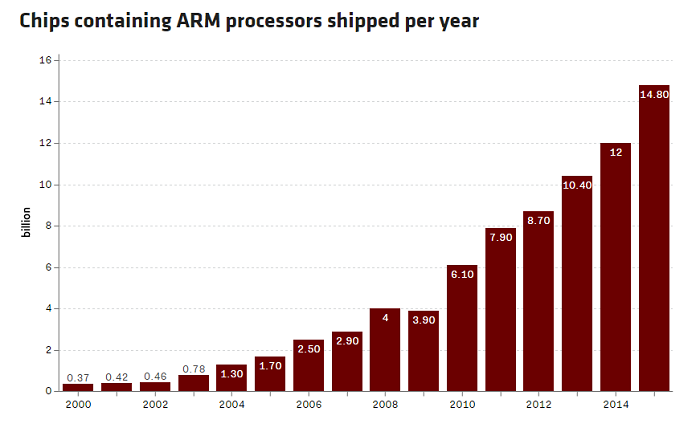Following two weeks of negotiations, Japanese firm Softbank has announced it will acquire ARM Holdings, widely considered the most important company in the mobile processor industry.
At the end of the day, the two sides agreed to an all cash deal of $32 billion.
 Softbank’s Masayoshi Son meets with ARM Holdings chairman Stuart Chamber. (Via)
Softbank’s Masayoshi Son meets with ARM Holdings chairman Stuart Chamber. (Via)
News of the agreement came as a bit of surprise to most in the industry. For one, the fact that ARM’s processor designs power more than 95% of mobile devices had many under the impression that the company was not looking to sell. Secondly, ARM is incredibly removed from Softbank’s other tech holdings, which includes a controlling interest in Sprint, its own mobile carrier business in Japan, as well as investments in Alibaba, OlaCabs, Snapdeal, and more.
So, why is Softbank buying ARM? Simply put, it comes down to reach.
You see, ARM doesn’t make products; in fact, the company doesn’t even design the chips that are eventually sold and used in mobile devices. Instead, it designs the core engines that get built into other companies’ chips. Due to its efficiency and low licensing fee, the company’s designs are used by most chipmakers in the mobile device world, including major players like Qualcomm and Nvidia, as well as industry leaders Apple and Samsung.
 Source: ARM Holdings
Source: ARM Holdings
The business model has worked out fairly well for ARM over its 26 years in business. In fact, just last year ARM reported revenue of $1.5 billion, with a profit of $448 million.
The company has, however, noticed a slight stagnation in portfolio growth in the mobile device industry. To address the issue, ARM has begun focusing on designing chips for routers and other devices in the networking industry; currently, it has a 15% market share, with expectations that it will increase to 45% by 2020. The company has also started looking at designing for servers, though that’s considered more of a long-term goal, with Intel’s monopoly-like hold on that particular industry.
What’s really caught the eye of ARM’s leaders, though, is the Internet of Things (IoT); specifically, the opportunity it has to expand its sphere of influence — both in regards to the number of chips using the ARM design outside of smartphones, as well as the kinds of products to which its designs are being applied.
Softbank also recognizes this opportunity and has indicated that it will make certain investments to help ARM extend its reach into the IoT world, and ensure the company locks in the same level of influence as it has with mobile devices.
“ARM will be an excellent strategic fit within the SoftBank group as we invest to capture the very significant opportunities provided by the Internet of things,” said SoftBank CEO Masayoshi Son in a statement. “This is one of the most important acquisitions we have ever made.”
Specifically, Softbank cited the fact that it will hire more engineers for ARM as well as look to make key acquisitions that will complement ARM’s services and ensure the company maintains its R&D edge.
In terms of the more immediate impact this deal will have on the IoT world, ARM is currently working on its own operating system for the Internet of Things called “mbed.” The goal here is to create a platform that makes it easier for companies entering the IoT world to select an ARM-based chip and instantly set up a working connected device. On the other side, Softbank just announced a joint venture with all-things-IoT-related company Aeris. The goal here is to push the company’s network and platform in Japan, India, Europe, and the US, for such markets as automotive, household, and more.
Knowing this, it’s much easier to see how ARM fits into Softbank’s broader strategy to conquer IoT. It’s also an unspoken understanding that the leaders at ARM recognize the deal with Softbank as a quicker path to getting its power solutions into newer chip markets for automotive, home, industrial, and more.
More plainly spoken — ARM now has deeper pockets, and Softbank has a proven technological resource that it can use to better reach the companies already establishing themselves in tomorrow’s IoT world.
Advertisement
Learn more about ARM





